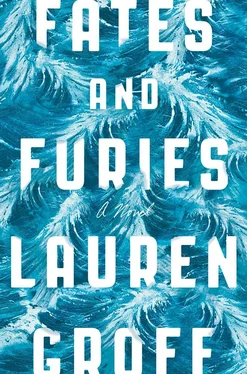He skipped Thanksgiving, though they’d had plans with friends and family in the house in the country; she’d had to cancel, ate the custard out of the pumpkin pie she’d made the day before and tossed the crust out the window for the raccoons. On the phone, Mathilde’s voice had wobbled. Lotto’s voice went distant. He said he was extending the stay into mid-December. She said something cutting and hung up. He called three times and she didn’t pick up. The fourth time, she would, she decided. But though she waited by the phone, he didn’t call back.
When he’d talked of Leo, there was a pulse under his words, a thrill. And suddenly, she could taste his infatuation. It left a bitterness on the back of her tongue.
Mathilde dreamt of Leo Sen. She knew he was a young man, from the few bios that existed online. And though Lotto was thoroughly straight — the daily greedy need of his hands told her this — her husband’s desire had always been more to chase and capture the gleam of the person inside the body than the body itself. And there was a part of her husband that had always been so hungry for beauty. It was out of the question that Leo Sen’s body could steal her husband; it was not out of the question that with his genius Leo could take her place in Lotto’s affections. This was worse. In the dream, they were sitting at a table, Mathilde and Leo, and there was a giant pink cake, and though Mathilde was hungry, Leo was eating the cake, delicate bite by delicate bite, and she had to watch him eat it, smiling shyly until it was gone.
—
SHE SAT FOR A LONG, LONG TIME at the kitchen table, and every moment she sat, the anger took on mass, then darkness, then scales.
“I’ll show him,” she said aloud to God. God wagged her tail sadly. The dog missed Lotto, too.
It took ten minutes to make the arrangements, another twenty to pack herself and the dog. She drove off through the cherry trees, resolutely not looking at the little white house in the rearview mirror. God had shivered when she handed her over at the kennel. Mathilde had shivered all the way to the airport, on the plane, had taken two Ambien, and stopped shivering to sleep all the way to Thailand, waking with a bleary head and a blossoming urinary tract infection from holding her bladder while she slept.
When she walked out of the airport into the humidity, the human roil, the tropical stink and wind, her legs went weak.
Bangkok flashed by, pink and gold, swarms of bodies beneath the streetlights. Strands of holiday lights snaked up the trees, a kindness to the tourists. Mathilde’s skin was thirsty for the moist wind, now blowing rotten with marsh reeds and mud, now blowing eucalyptus. She was too agitated for sleep, the hotel too hygienic, so she wandered back out into the dark. A bent woman swept a sidewalk with a bundle of sticks, a rat perched atop a wall. Mathilde wanted the bitterness of a gin and tonic on her tongue, and followed music blindly under a portico into a nightclub, empty so early in the night. Inside was tiered, balconied, the stage being set up for a band. The bartender patted Mathilde’s hand when she delivered the drink, flash of warmth on the skin, then the cold of the glass, and Mathilde wanted to touch the lushness of the woman’s black eyelashes. Someone sat beside her, an American man bursting out of his T-shirt, his head fuzzy like a ripe peach. Beside him a plump and laughing Thai woman. His voice oozed with intimacy; he’d already taken possession. Mathilde wanted to seize his words, roll them up in her fist, shove them down his throat. Instead, she left, found the hotel, lay sleepless in bed until dawn.
In the morning, she found herself on a boat to the Phi Phi Islands, salt on her lips from the wind. She had her own bungalow. She’d paid for a month, imagining Lotto coming home to an empty house, no dog, searching all the rooms for her, finding nothing, the terror hatching in his heart. Had someone kidnapped her? Had she run away with the circus? She was so agreeably flexible when it came to Lotto that she could have been a contortionist. Her hotel room was white and full of carved wood; they’d put polished strange fruits in a red bowl on the table and a towel folded in the shape of an elephant on the bed.
She opened the French door to the shushing sea, the call of children down the beach, and stripped the bed of its comforter because she wanted other people’s germs nowhere near her skin, and lay back and closed her eyes and felt the old devastation rasp itself away.
When she woke, it was dinnertime, and the devastation was back, sharp-toothed, and it had gnawed a hole inside her.
She cried in the mirror, putting on her dress, her lipstick, cried too much for eye makeup. She sat at her own table alone, among the flowers and shining cutlery, and kind people served her kindly and positioned her facing the sea so she could cry in peace. She ate a bite of her food and drank a whole bottle of wine and walked home to her bungalow in bare feet over the sand.
The only day she had in the sun she wore her white bikini that bagged on her because she’d lost so much weight. The waiters saw the tears sliding out from under her sunglasses and brought her cold glasses of fruit juice without being asked. She burned and stayed in the sun until the skin on her shoulders was blistered.
The next morning, she awoke to an elephant in the window, slowly carrying a little girl up the beach, led by the halter by a slender young woman in a sarong. In the night, the anger had struck at the sadness and chased it off. Mathilde’s body ached with yesterday’s sun. She sat up and saw her face in the mirror opposite the bed, red and lightning sharp and already resolved.
Here was the Mathilde she’d grown so accustomed to, the one who had never not fought. Hers was a quiet, subtle warfare, but she had always been a warrior. That poetess was imaginary, she had to tell herself; that skinny musician named Leo had nothing on her because he was a boy, and he was powerless. Of course she’d prevail. How dare she walk away.
Two days after she arrived, her plane lifted off the ground and she was in the air again. She had spent six days molten on the inside. They handed God to her at the kennel, and the dog was so happy to see her she tried to nose her way into Mathilde’s torso. Mathilde came home to the frigid house, stinking of the garbage she hadn’t bothered to take out before she left. She put her suitcase in the closet upstairs to deal with later and sat down at the kitchen table with a cup of tea to strategize. The problem wasn’t what she would do to go fetch Lotto back to her. It was what she wouldn’t do. There were too many choices, there was too much possibility.
In a few moments, she heard a car on the drive. On the gravel came a step with a hitch in it.
Her husband came in the door. She let him wait.
Then she looked at him across the great distance. He was thinner, finer than when he left. As if whittled. On his face there was something she dropped her eyes to keep from seeing.
He sniffed the air, and to prevent him from speaking about the smell of garbage and the coldness of the house, which would have broken something, would have made it impossible to return to him, she crossed the kitchen and locked his mouth to hers. The taste, after so long, was strange, the texture rubbery. A shock of unfamiliarity. There was a slight shifting in him, a sense of bending. He was about to speak, but she pushed her hand hard against his mouth. She would have shoved her hand inside him if she could to keep the words from coming out. He understood. He smiled, dropped his bag, walked her backward into the wall. His great body on hers. The dog whimpering at his feet. She took her husband ferociously by the hips and pulled him ahead of her through the hall and up the stairs.
Читать дальше












